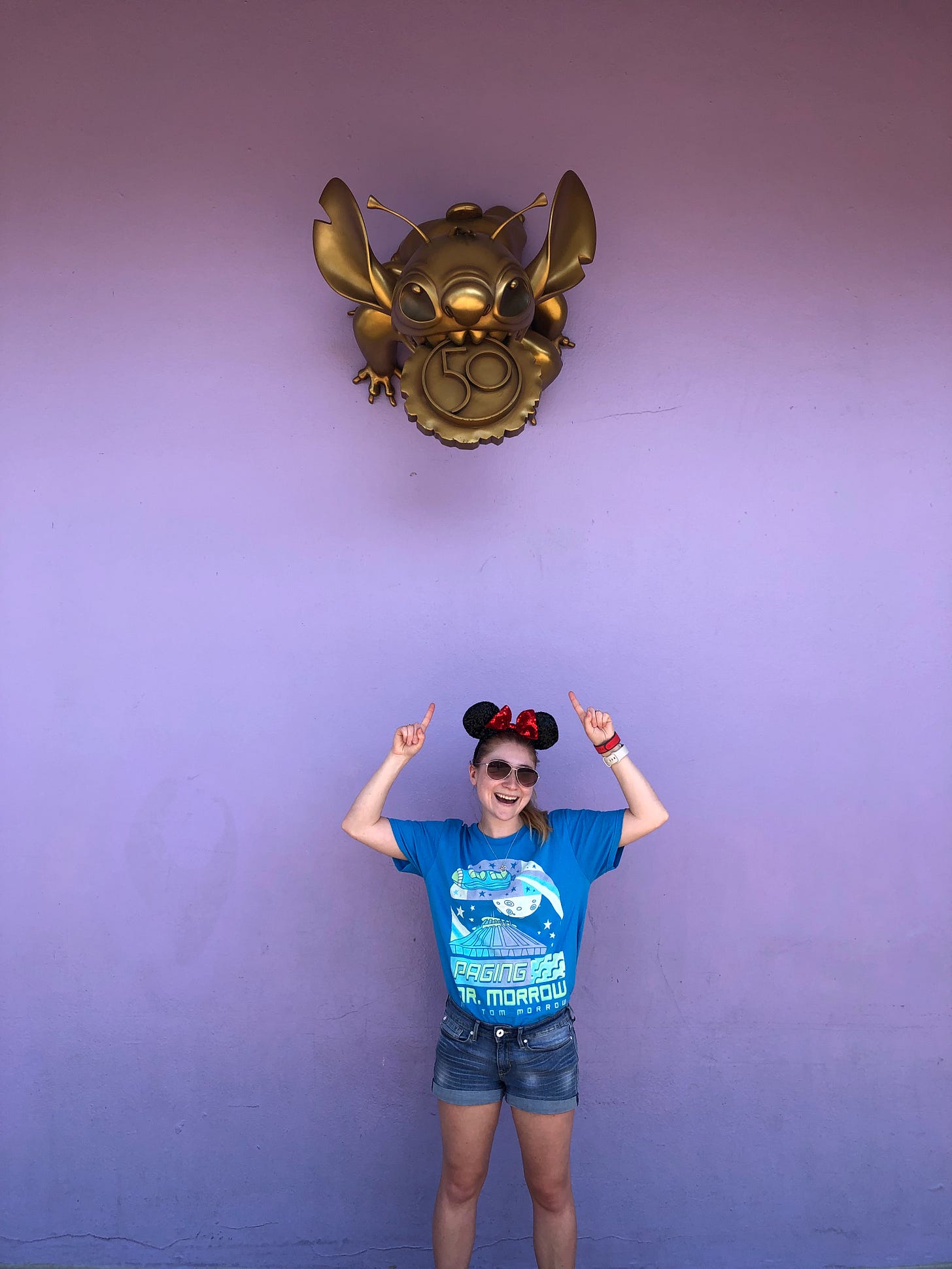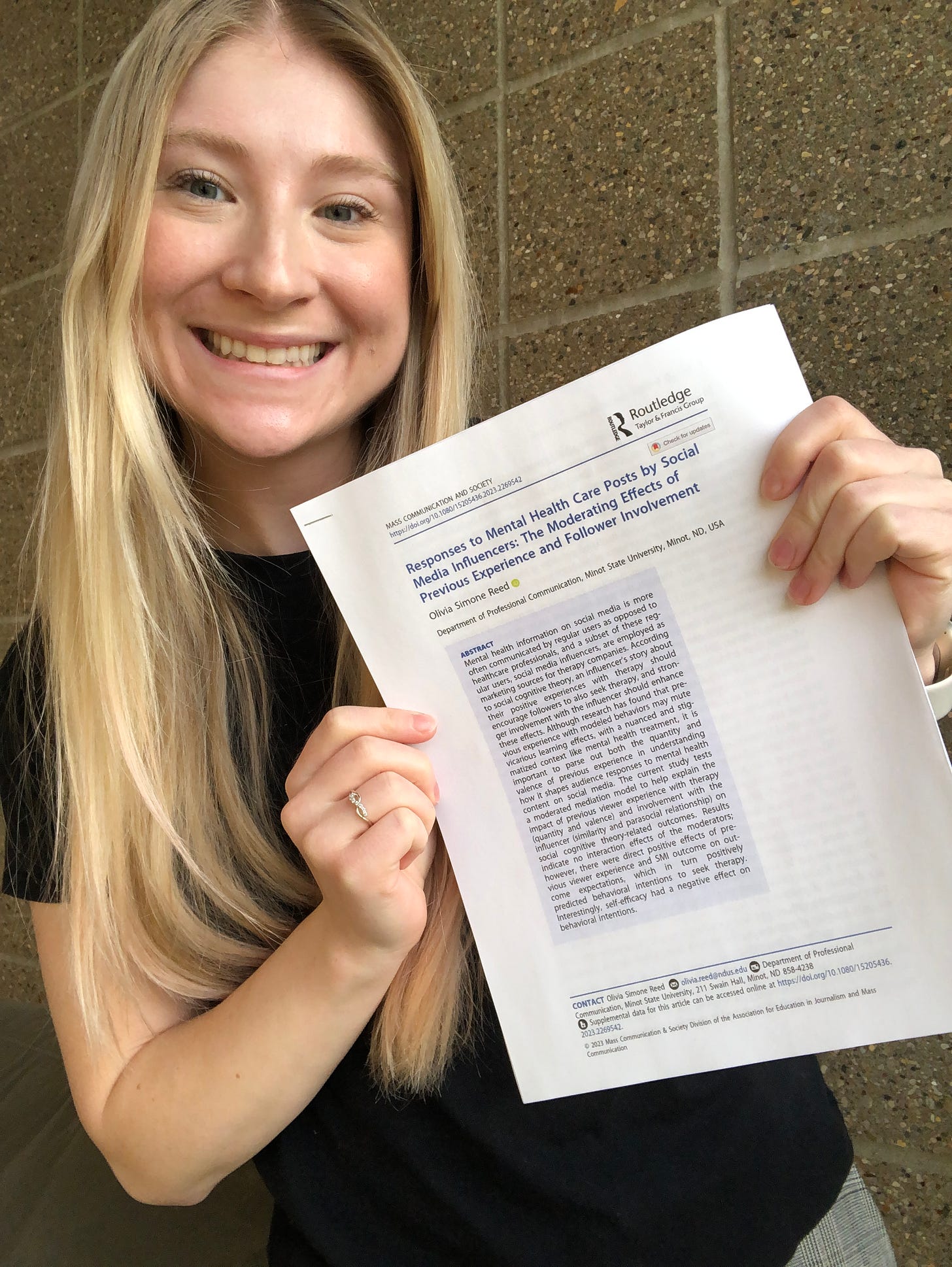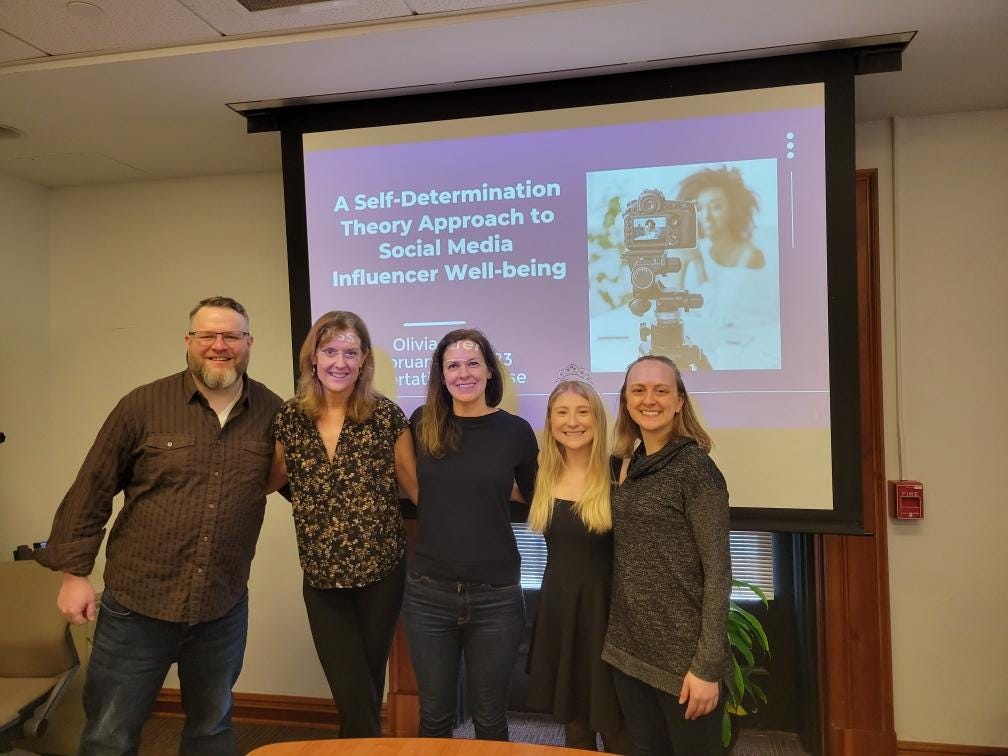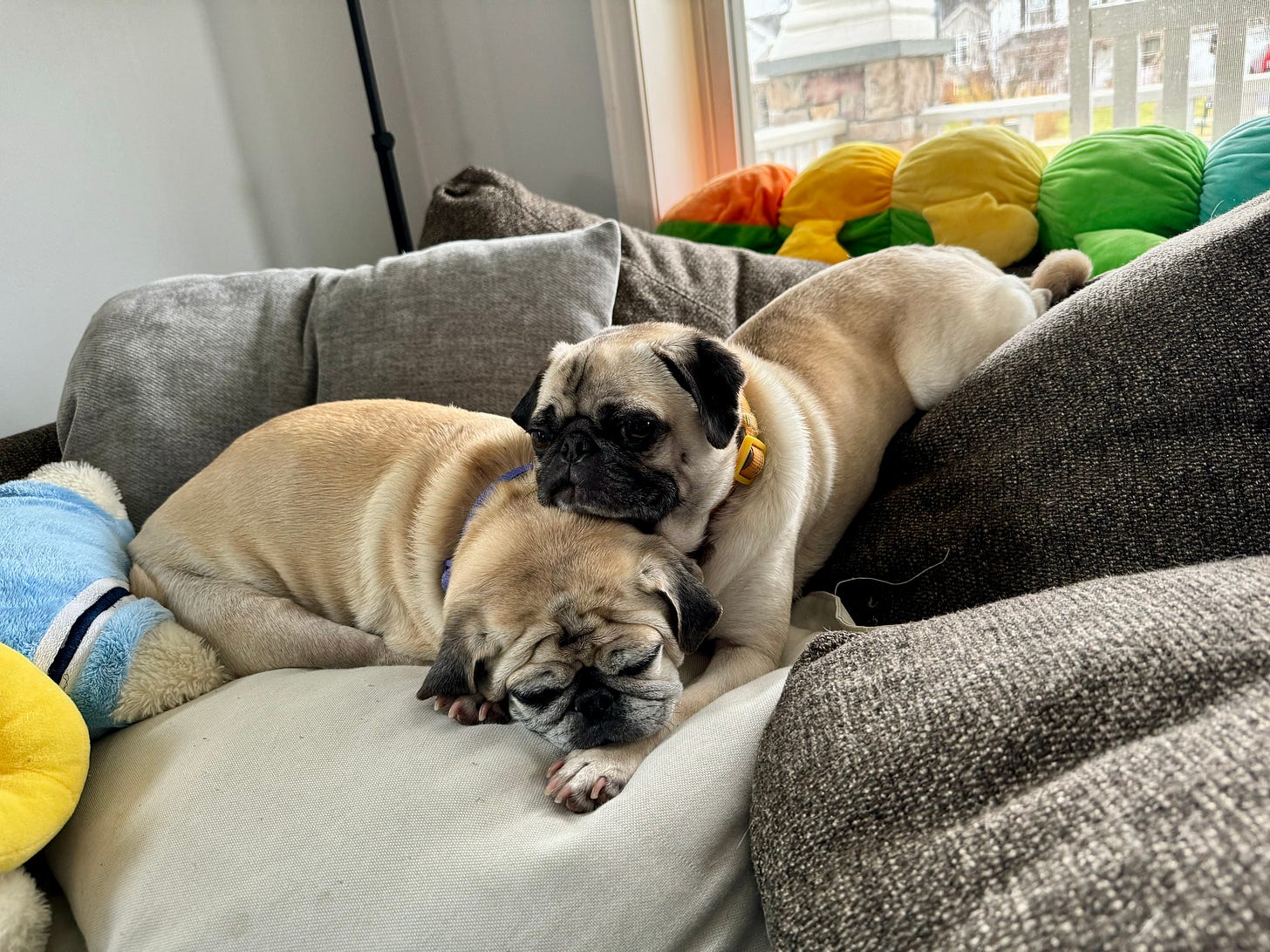Influencers, mental health, and influencers' mental health
A discussion with Dr. Olivia Reed on how influencers influence us on mental health, and how we influence them
When I was in graduate school more than a decade ago, Steve Jobs died from pancreatic cancer and I started studying the influence of celebrity health news on public perceptions of diseases as well as prevention and detection behaviors. Now, the buzz in this line of health communication goes beyond ol’ fashioned global public figures to social media influencers.
If you are unfamiliar with the term “influencer,” it’s a type of niche celebrity: someone who has garnered a following on social media, often for a particular topic (makeup tutorials, planning vacations, toddler sleep advice, vegan diets, beer making, distance running, pet fashion, how to become an influencer yourself, you name it).
Now, as a professor, I have the great privilege of working with smart students who are interested in studying how social media influencers are shaping our perceptions of health, including mental health. And, with so many young people making a living off of social media-based brands and businesses, it is important to consider their mental health as always-on content producers whose own lives become their livelihoods.
The U.S. Senate held hearings yesterday discussing the connections between social media and mental health, particularly for children and adolescents. Now, more than ever, we need rigorous social science research to understand the complex ways in which social media may exacerbate as well as, for certain audiences, provide the solace, social support, or encouragement needed to overcome the stigma associated with mental illness.
To dive into this important topic, I interviewed a former graduate student, now professor herself, Dr. Olivia Reed of Minot State University. Dr. Reed is an expert on the influence of influencers. This expertise is professional and personal as she has built up an online following, herself.
Q1: Would you tell us a bit about what got you interested in studying social media influencers (SMIs), in general?
Dr. Reed: As an undergraduate, YouTube was my go-to for relaxing. Watching my favorite vloggers or Buzzfeed personalities became my favorite part of the day!
It wasn’t until I took a Media Effects class that I became aware of how much I was influenced by these content creators. I took up running after seeing a creator go from zero running experience to running a half marathon. I bought recommended make-up. I took a semester off from school to participate in the Disney College Program!
At that point, I had started to create content on YouTube and was blown away that my audience was telling ME that I was inspiring them to do the Disney College Program, too. The fact that people were taking time off of school to move to Florida based on a few videos they had seen on YouTube made me realize the power of social media influencers!
Q2: You recently published a piece in Mass Communication & Society about the effects of influencers posting about their own experiences with therapy. You wanted to see if an influencer saying they had a positive or negative experience would therapy would shape how their followers might think about pursuing therapy for their own mental health. Could you tell us a little bit about how you tested this idea and what you found?
Dr. Reed: This study was so fun to conduct because I partnered with actual social media influencers! With the influencers’ permission, I created a mock Instagram post for each creator detailing either a positive or negative experience with therapy. I inserted this mock post into a survey, and then the influencers shared the survey link with their followers. Research on influencers typically has participants view a random content creator, but the approach in this study allows for us to more accurately account for how relationships followers have the influencer, impacts the influencing.
I found that (not surprisingly) when influencers portrayed a positive experience with therapy, their audience was more likely to also expect a positive experience with therapy for themselves, which led to increased intentions to seek therapy. When the experience portrayed was negative, audience members anticipated they would also have a negative outcome if they attended therapy, thus intentions to seek therapy decreased.
When audience members had—prior to the study—been to therapy themselves, they anticipated positive outcomes of therapy and had increased self-efficacy, which is the belief one can do something, in this case, attend therapy. However, as perceptions of self-efficacy increased, behavioral intentions to go to therapy decreased. This is odd, since self-efficacy and behavioral intentions should go hand in hand. One possible explanation is that when people felt like they could attend therapy, they had already done so, and thus did not feel the need to seek more at this time.
Overall, this study shows that how influencers talk about their mental health treatment matters to their followers!
Q3: For your dissertation, you studied how influencers are—themselves—impacted by being online and posting on social media all the time. Could you tell us the big take aways from that study?
Dr. Reed: A big takeaway from my dissertation research was that feeling competent (confident and capable) in one’s role as an influencer led to enhanced well-being: both general levels of happiness and a sense of meaning and purpose in one’s life. Feelings of competency were enhanced when influencers were motivated to post content because they enjoyed making content and/or liked teaching others about their niche. Posting because influencing was their source of income also increased competency! Typically, we would expect that an extrinsic motivation—feeling pressure to post due to an outside source, like making an income—would harm competency, but in this case it increased it. My explanation is that influencing typically starts as a hobby, so being paid to do it means you’ve made it! Furthermore, when competency was enhanced, so was well-being!
Unsurprisingly, when influencers felt pressured by their audience or by the platforms to post, their competency was harmed. This in turn, harmed well-being.
The big takeaway here is that feeling confident in your skills as an influencer—the storytelling aspect, the ability to make money, knowledge of the platform and how to edit content—is key to maintaining positive well-being in this career field. Influencers can help themselves by constantly learning about their niche (to then pass that info to their audience), practicing editing skills, and learning about what content is doing well on their particular platform.
Q4: For people interested in SMIs and mental health, are there any particular people or accounts you would suggest we follow? Put another way, are there influencers out there who you think “get it right” as to how they talk about mental health?
Dr. Reed: In terms of general lifestyle influencers, I’m a fan of how YouTubers Alfie Deyes and his fiancé Zoe Sugg talk about mental health. Alfie attends therapy on a weekly basis, and this attendance is casually mentioned within his vlogs. Part of encouraging people to go to therapy is ensuring it’s not stigmatized and discussing it as casually as one would mention going to brunch is a good way to do that. Zoe on the other hand, has been very open about her anxiety and panic attacks, and how she’s worked through those with her therapists. In my opinion, they provide a nice juxtaposition that therapy can be for those who simply want some guidance navigating life and for those who have more challenging mental health issues.
I also follow a few therapists on Instagram whose content I really love. In particular, Dr. Justin Puder (@amoderntherapist) and Amanda White (@therapyforwomen) have a really balanced view on life and mental health. Kobe Campbell (@kobecampbell_) is another therapist who provides informative content. Of course, this is no substitute for actual therapy, but it’s nice to have reminders pop up on an app most of us are already using.
Q5: A lot of my students are interested in becoming influencers, and some of them already have reached that status. What advice would you give them as someone who has also had success in that realm but knows from your research that it can be taxing on one’s mental health?
Dr. Reed: Remember that social media is a job, so, treat it as such. Don’t allow low view counts or rude comments to impact your self-worth. Don’t let replying to comments or planning content creep into every part of your day, instead, schedule a day/time each week to tackle these tasks. Additionally, while it’s true that disclosing creates a stronger bond with your audience, you are allowed to keep things private! Maintain boundaries with followers; both in protecting yourself with what you disclose and by keeping conversations with followers in public channels (e.g., comment section, public posts) rather than private channels (direct messages). If you notice a question is repeated within your DM’s, you can create an entire post on that topic! I don’t know of any research so far that looks at how expectations of access to an influencer change from a follower’s perspective when a conversation moves to a private channel (I’m hoping to study this soon). But, as someone who has experienced this as a content creator, it only adds stress when your followers have that increased access to you. And of course, if you need a break, then take it! If you lose a few followers in the process, did you really want them to be a part of your community anyway?
Q6: Anything else you’d like to add that you think is important to highlight on these topics of influencers and mental health?
Dr. Reed: I think that telling influencers to simply “shake off” negative comments is downplaying how difficult it can be to receive those. Because influencers do give so much of themselves (i.e., disclosing personal stories, creating content with the audience in mind, etc.) it is easier said than done to “not take it personally.” Framing content creation as a job and not as part of one’s identity is a good first step in my opinion, but I also encourage content creators to use tools like content moderation to help protect themselves. On Instagram, you can ban certain phrases or keywords from appearing in your comments. Another option is having someone else filter through your comments first. Influencing is definitely a unique job where your privacy is the product. And while it’s fascinating as a viewer, and can be healing as a content creator to have an audience that wants to listen, this can also open the door to feeling hurt when you get negative feedback. I think being mindful of this can help creators to set boundaries and take time off before they reach a breaking point.








